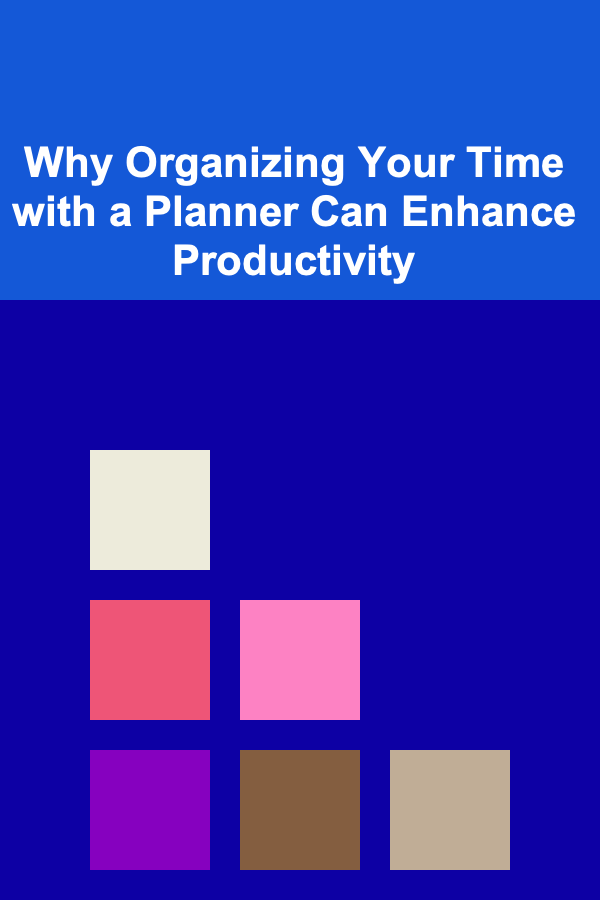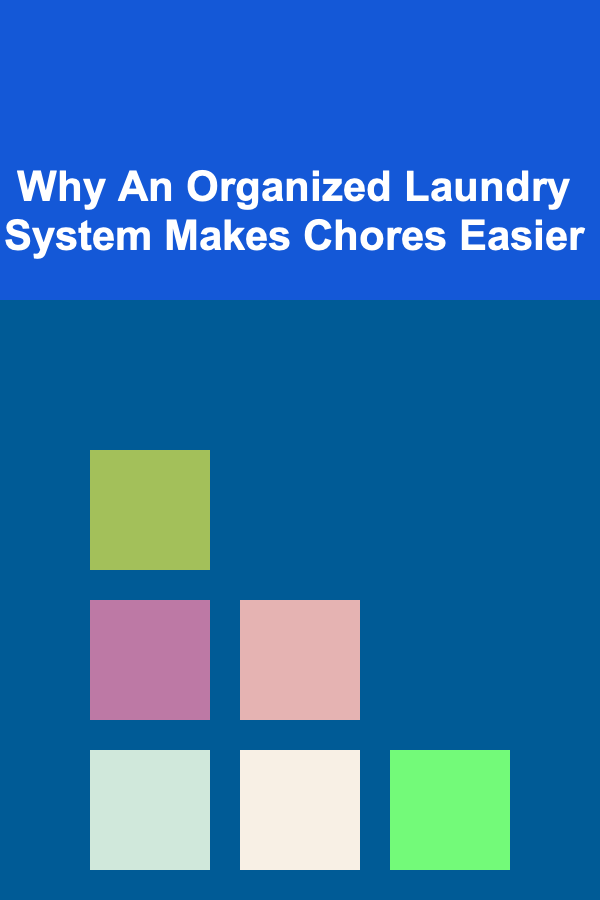
Why Organizing Your Time with a Planner Can Enhance Productivity
ebook include PDF & Audio bundle (Micro Guide)
$12.99$11.99
Limited Time Offer! Order within the next:

In an age marked by constant distractions and relentless demands on our time, finding effective ways to enhance productivity has become essential for both personal and professional success. One of the most impactful tools in achieving this goal is a planner. Utilizing a planner for organizing your time can lead to significant improvements in productivity, efficiency, and overall well-being. This comprehensive article will explore the various benefits of using a planner, the best practices for effective planning, and how to integrate this habit into your daily routine.
Introduction
Time is one of the most precious resources we have, yet it often feels as though there are never enough hours in the day to achieve everything we want. Enter the planner---a versatile tool that helps individuals organize their time, set priorities, and track progress. By systematically organizing your tasks and commitments, you can enhance focus, reduce stress, and ultimately boost productivity. This article will delve into why using a planner is beneficial and how to make it an integral part of your life.
Understanding Productivity
2.1 Definition of Productivity
Productivity refers to the efficiency with which tasks and activities are completed. In a broader sense, it encompasses:
- Output vs. Input: The amount of work completed in relation to the resources (time, energy, materials) used.
- Quality of Work: Not just about quantity, but also the caliber of results achieved.
2.2 Factors Affecting Productivity
Several elements play a role in determining productivity levels:
- Environment: A conducive workspace can significantly impact focus and efficiency.
- Motivation: A motivated individual is more likely to be productive.
- Time Management Skills: The ability to effectively manage time is crucial for high productivity.
The Role of Time Management in Productivity
3.1 Importance of Time Management
Effective time management allows individuals to:
- Allocate Resources Wisely: Ensures that time is spent on high-priority tasks.
- Reduce Stress: Helps prevent overwhelm by breaking down tasks into manageable segments.
- Achieve Goals: Facilitates progress towards personal and professional objectives.
3.2 The Connection Between Time Management and Stress Reduction
Poor time management often leads to increased stress and anxiety:
- Last-Minute Rushes: Ineffective planning can result in scrambling to complete tasks at the last minute.
- Unachieved Goals: Failing to manage time may lead to unmet deadlines and unfulfilled objectives, contributing to feelings of inadequacy.
Conversely, effective time management fosters a sense of control over one's schedule, reducing anxiety and promoting well-being.
Benefits of Using a Planner
4.1 Enhanced Organization
A planner provides a structured format for organizing tasks:
- Visual Layout: Seeing a visual representation of your tasks can make them feel more manageable.
- Categorization: Allows for grouping similar tasks, making it easier to identify what needs to be done.
4.2 Improved Focus and Concentration
Planning helps eliminate distractions:
- Defined Tasks: Clearly outlined tasks allow for concentrated effort without unnecessary diversions.
- Time Allocation: Knowing how much time is designated for each task mitigates the tendency to multitask ineffectively.
4.3 Better Goal Setting and Tracking
Planners facilitate effective goal setting:
- SMART Goals: Using a planner encourages the formulation of Specific, Measurable, Achievable, Relevant, and Time-bound goals.
- Progress Tracking: Regularly reviewing accomplishments promotes accountability and motivation.
4.4 Increased Accountability
Using a planner cultivates accountability:
- Personal Responsibility: Writing down tasks creates a commitment to completing them.
- Reflection Opportunities: Scheduled reviews allow you to assess performance and adjust plans accordingly.
Types of Planners
5.1 Physical Planners
Physical planners---such as paper notebooks or bound journals---offer tactile engagement:
- Customization: Many users appreciate the ability to personalize their planners with colors, stickers, and designs.
- Distraction-Free: Unlike digital devices, physical planners don't come with notifications and alerts that can break concentration.
5.2 Digital Planners
Digital planners use applications or software for organization:
- Integration with Devices: Sync across multiple devices, allowing for access anywhere.
- Flexibility: Easy to rearrange, copy, or delete tasks without cluttering a page.
5.3 Hybrid Options
Many find a combination of physical and digital planners works best:
- Best of Both Worlds: Allows for a tactile experience while benefiting from digital conveniences.
- Adaptability: Customize your approach based on specific tasks or situations.
Best Practices for Effective Planning
6.1 Daily, Weekly, and Monthly Planning
Different planning timeframes serve unique purposes:
- Daily Planning: Focus on immediate tasks, prioritize key activities, and allocate time slots.
- Weekly Planning: Provide a broader view of upcoming tasks and commitments, helping to allocate resources efficiently.
- Monthly Planning: Set long-term goals and assess progress toward achieving them.
6.2 Prioritization Techniques
Utilizing prioritization strategies can improve productivity:
- Eisenhower Matrix: Categorizes tasks into four quadrants based on urgency and importance, helping to clarify priorities.
- ABC Method: Assigns A, B, or C labels to tasks based on priority level, guiding focus throughout the day.
6.3 Time Blocking Method
Time blocking involves allocating specific time periods to tasks:
- Focused Work Sessions: Assign blocks of uninterrupted time for concentrated efforts.
- Structured Breaks: Schedule breaks within time blocks to recharge and maintain focus.
Integrating a Planner into Your Daily Routine
Making a planner a regular part of your life requires consistency:
7.1 Morning Rituals
Kickstart your day with intentional planning:
- Daily Review: Take five to ten minutes each morning to review tasks and prioritize your day.
- Set Intentions: Define clear objectives for the day ahead to guide your focus.
7.2 Evening Reviews
Reflecting on your day bolsters accountability:
- Daily Reflection: Spend a few minutes assessing what was accomplished and what needs to be adjusted for tomorrow.
- Preparation for Tomorrow: Prepare the next day's plan before winding down for the evening.
Overcoming Challenges in Time Management
Despite its advantages, implementing a planner can come with challenges:
- Resistance to Change: Establishing new habits takes time. Be patient and persistent.
- Inconsistent Use: Develop routines around planning to maintain discipline.
- Overloading Tasks: Start with manageable daily goals to avoid becoming overwhelmed.
Case Studies: Successful Time Management with Planners
Case Study 1: The Busy Executive
Sarah, a corporate executive, struggled with managing her myriad responsibilities. After integrating a digital planner into her routine, she began utilizing time-blocking techniques. This method enabled her to dedicate focused time to essential projects, ultimately leading to improved performance and reduced stress levels.
Outcome: Sarah reported feeling more in control of her workload, resulting in higher job satisfaction and better work-life balance.
Case Study 2: The Student
Mike, a university student, faced difficulties keeping track of assignments and deadlines. He adopted a physical planner to map out his semester, using color-coding for different subjects. By regularly reviewing his planner, he could prioritize tasks and allocate study sessions effectively.
Outcome: Mike experienced enhanced academic performance and less last-minute cramming, leading to reduced anxiety during exam periods.
Case Study 3: The Freelancer
Lena, a freelancer juggling multiple clients, found herself overwhelmed by deadlines. Implementing a hybrid planner strategy---with a digital calendar for appointments and a physical planner for daily tasks---allowed her to have a comprehensive overview of her commitments.
Outcome: Lena achieved greater clarity regarding her workload, leading to timely project completions and improved client satisfaction.
Conclusion
Organizing your time with a planner is not merely a productivity hack; it's a lifestyle change that can significantly enhance your effectiveness and well-being. Whether you choose a physical, digital, or hybrid planner, the key is consistency and intentionality. By establishing clear routines, setting priorities, and reflecting on your progress, you empower yourself to take charge of your time.
As you embark on this journey, remember that productivity is not about doing more in less time; it's about maximizing the value of your time. With a planner in hand, you can cultivate a more organized, focused, and fulfilling life---one day at a time. Happy planning!
Other Products

How to Create a Bookkeeping Checklist for Small Business Owners
Read More
How to Create a Relaxing Bedroom Retreat on a Budget
Read More
How to Offer Remote IT Support Services to Home Users
Read More
Navigating the Complexities of HR Coordination: A Practical Handbook
Read More
Smart Financial Planning for College Tuition: Strategies to Reduce Debt
Read More